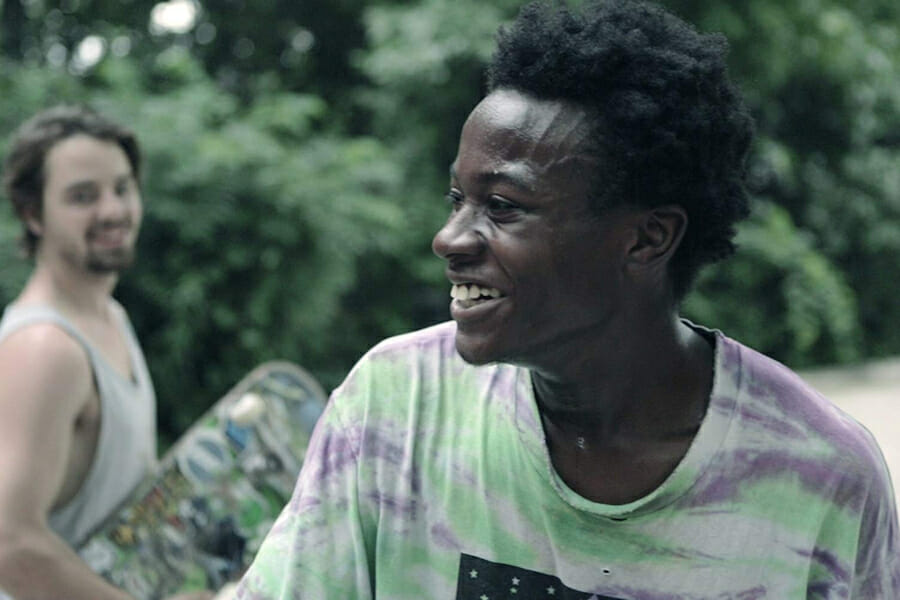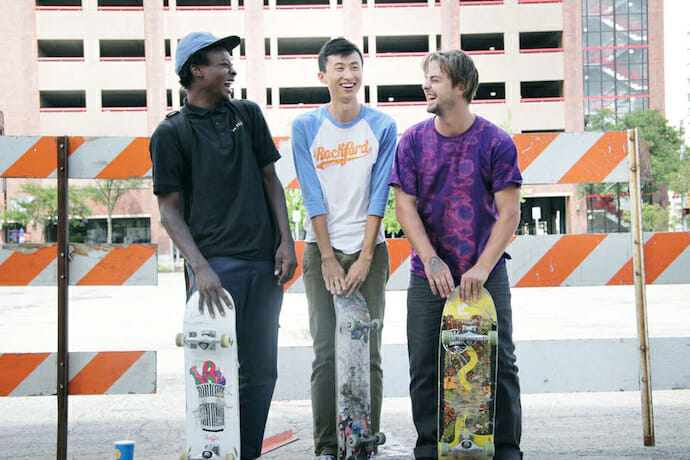
On ‘Minding the Gap’ – Bing Liu’s 2019 Academy Awards Shortlisted Documentary
Since the first half of 2018, I have been following the repercussion of Minding the Gap, the debut feature of the 24-year old Sino-American filmmaker, Bing Liu.
The film received a Special Jury Prize at the 2018 Sundance Film Festival and has since been critically acclaimed by scholarly reviews and audiences. Minding the Gap won prizes at several other major festivals dedicated to Documentary Film, such as Denmark’s CPH: DOX and the Full Frame Documentary Film Festival (Durham, NC).
Almost a year later, Minding the Gap made the documentary shortlist for the 2019 Academy Awards and, as it appears, has great chances of joining the 5 nominees. It is currently being streamed on Hulu and will be part of PBS’ P.O.V.
My interest in watching the film grew when in August 2018 I was able to attend the Kartemquin Films plenary session at the XXV Visible Evidence, traditional Documentary Film world conference, held that year by Indiana University, and at which Bing Liu was also present.
Kartemquin Films, of which Minding the Gap is a fruit, is a documentary organization based in Chicago that celebrated its 50th anniversary in 2016. Since its inception, Kartemquin has focused on Documentary Film as a way of addressing socially urgent issues: from the anti-war movements of the late 1960s and the engagement with the civil rights matter to student and working-class strikes, gender issues, access to public health, gentrification, racial relations/tensions, impoverishment homelessness, among other topics.
An expansion of Kartemquin’s scope and projection took place in the 1990s with the advent of Hoop Dreams (1993) by newly arrived director Steve James. The following of two young African-American students into the dream of becoming professional basketball players had a strong impact both on critics and audiences. As much as it was a commercial success, the film is currently recognized as a watershed in the history of Documentary Cinema.
In the same way, Hoop Dreams confirmed one of Kartemquin’s main methodological/stylistic foundations: the development of documentary narratives from real situations and characters, based on the methodology of a direct/vérité following, often in a chronological and temporally extensive approach.
In the 2010s perspective, Minding the Gap is the result of Bing Liu’s participation in Kartemquin’s Diverse Voices in Documentary (DVID) program, which consists of the mentoring and orientation to the development of documentary narratives directed by young non-white filmmakers.
Bing Liu’s film consists of the meditation around generational issues, pointing out to matters such as parenthood, toxic masculinity, parental abuse, and domestic violence. Liu’s meditation takes shape narratively from individuals and situations he is directly relating to his own family and two of his close friends, Zack and Kiere. Liu and his lifelong friends share a vision of skateboarding as a prismatic vector: not only of leisure, but a more profound lifestyle that can serve the purpose of therapy in face of growing up in one of the most decadent, impoverished, and violent cities in the American Midwest (Rockford, IL, part of which is now known as “Rust Belt”).

Being an avid recorder of everyday situations of his youth, Bing Liu filmed his friends from adolescence, and the narrative of Minding the Gap recovers moments lived by the three of them in a span of twelve years. At a certain moment, Liu recognizes a key period of transformation and crisis, in which values and ideals could be put to the test in the face of the challenges of adult life in a rather unfavorable conjuncture. Dreams and hopes of youth are tested, as well as the possibility they have of incorporating into or distancing themselves from paternal and maternal figures — in their case, austere and violent — in the farewell of adolescence.
In its methodological and narrative choices, Liu’s film evokes the possibility of the production of experiential knowledge (personal, individual knowledge), which seems to still be a powerful approach in contemporary documentary film. The viewing of Minding the Gap reminds us, as spectators, that we are watching a movie of a post-adolescent filmmaker who recognizes the situations lived by himself and his friends as a potent way of addressing urgent social and collective issues. In particular, Minding the Gap seems to bring to the surface both the violence and the delights of a vérité approach applied to a personal/autobiographical perspective, in which the filmmaker has profound ties (friendship, love, family respect) towards portrayed individuals.
The film does not go unharmed to being perceived as “violent,” both in the axis thematic subject itself, but especially, in the narrative choices made by the filmmaker. As a dilemma of the autobiographical documentary, Minding the Gap makes us question how much it is possible to investigate, to inquire or to accuse people with whom we maintain ties of affection. Especially, in this case, when it seems that refraining ourselves to address potentially conflicting issues about those we love tends to be an equally questionable option.
